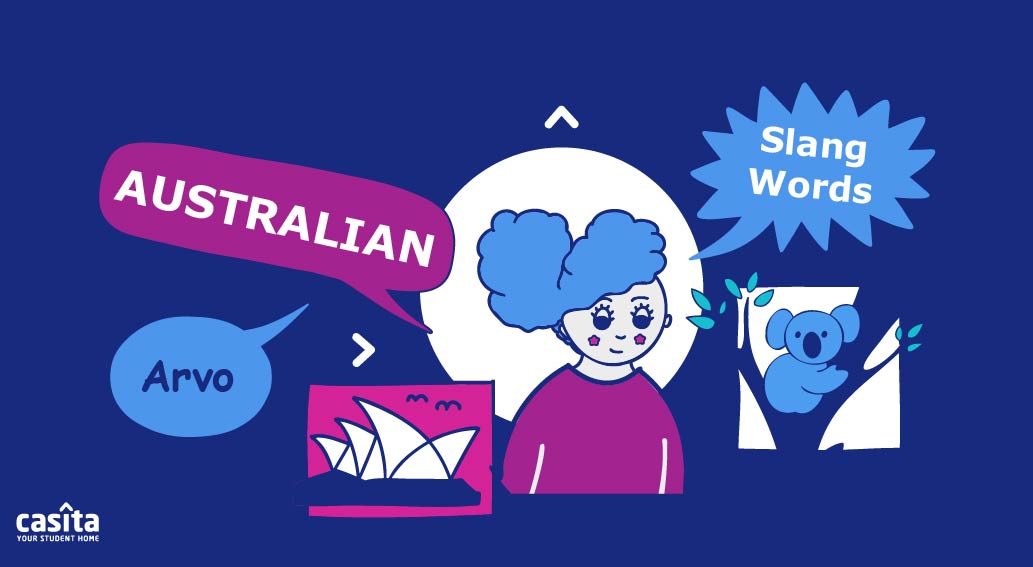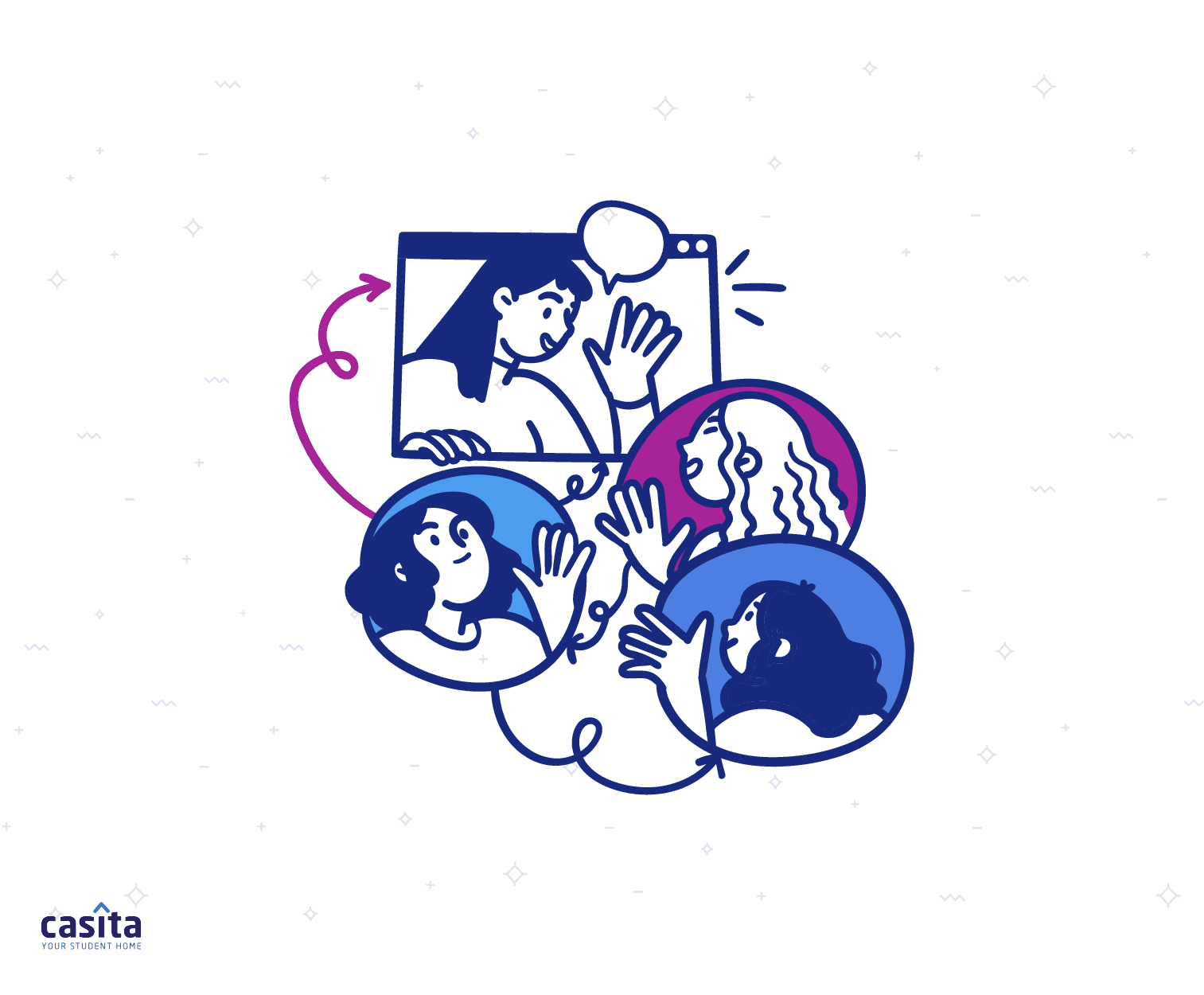Australian Slang Words Students Must Know
Tips and Advice
Exploring
5 mins read
Share

Updated at: 25 November, 2025
Published at: 16 August, 2019
By Allaa Ashraf
Australian Slang Words Students Must Know
Tips and Advice
Exploring
5 mins read

Updated at: 25 November, 2025
Published at: 16 August, 2019
By Allaa Ashraf
Share
Student life in Australia is an absolute blast! Nothing like it, I tell you, it is a ripper of an experience. Imagine this: You woke up in your tracie dacks with a desire to have a breakfast with your friends in a local cafe. You can also see smiling faces on other students as you cheerily exchange G-day greetings as you walk down the street.
The arvo rolls around, and it's time to hit the books (or maybe take a sneaky breather). Don't be surprised if your classmates throw around slang words like "chockers" or "ripper" during lectures, making it a uniquely Aussie academic adventure. After a hard day of study, it's time to fire up the barbie and enjoy some snags with your newfound friends. And if you're up for some fun, head to the local servo for a cheeky Maccas run or grab a tinny to relax by the beach. These are just a few of the reasons why you should study in Australia!
As a foreigner to Australian culture, we believe you may not have understood some of the words mentioned above. That’s okay, though. That’s what this blog is all about! We’re here to teach you Australian slang!
Australian slang is both distinct and colourful feature of the Australian culture and language. Among the international students studying in Australia, by becoming familiar with Australian slang, one is able to significantly improve their knowledge and adaptation into the local communities.
This article is intended to lead to an exhaustive list of Australian slang words commonly used in everyday conversations. Through the use of these words, students can easily manoeuvre the social setting and understand Australian way of life better. Come on, let’s dive in!
Australian Slang Words You Should Know:
Aussie = Australian
It simply means Australian, someone from Australia. So when Australian people refer to themselves, they say Aussies do so and so.
Arvo = Afternoon
Short for "afternoon," "Arrvo" is a widely used term to refer to the time between noon and evening. For example, "See you this arvo" means "See you this afternoon."
Sickie = Sick Day
Taking a "sickie" means taking a sick day off from work or school when one is not genuinely ill. It implies taking a day off for leisure or relaxation.
Servo = Petrol Station
Short for "service station," "servo" refers to a gas station or petrol station. Australians frequently use this term when discussing refuelling or purchasing items at a gas station.
Sheila = Girl
Yes, that is the Australian slang for girl.
Tinnies = Cans of Beer
But the Australian slang for beer is amber fluid. Some states call it a pint, and in others, it is a schooner. Stubby meaning? a squat bottle of beer typically holding 375 cl. Go figure!
Beauty! = Beautiful
If you want to know the Australian slang for beautiful, here it is. It is commonly used to say "great.”
Hooroo = Goodbye
Australian goodbye is “Hooroo”; sometimes they even “cheerio” like British people, a UK slang word.
Bonzer = Excellent
It is the Australian equivalent of the American term “awesome”. Aussies sometimes also use “ace” like British people.
Chrissie = Christmas
Yup. Aussies call Christmas a “Chrissie.” In Australia, cold seafood Christmas dinners are preferred over hot turkey ones.
Facey = Facebook
It is mostly popular among university students in Australia who want to refer to Facebook.
Barbie = Barbeque
You had it coming, didn’t you? An abbreviation for "barbecue," "barbie" represents a typical Australian social gathering where food is cooked on a grill outdoors. Australians love their barbies and often use this term to invite friends over for a casual outdoor meal.
Durry = Cigarette
Durry is the common Australian term for a cigarette. Among the younger generation, it is often called “ciggies” or “darts”. Both ways, stay away from smoking!
Billy = Teapot
Yep, unusual, isn’t it? A teapot has a nickname!
Bloody = Very
You’ll find that Aussies use this one quite a lot rather than simply saying “very”.
Dunny = Toilet
Yeah, they have a nickname for the toilet, too.
Sanger = Sandwich
Not “singer”, but “sanger”. This one pretty much refers to any sandwich.
Sunnies = Sunglasses
As you’ve noticed, Australians tend to use “ie” at the end of a slang word, and this one refers to sunglasses.
Tea = Dinner
We know, we know. This one is quite confusing. Your Australian friend might ask you over for dinner using this word, and you’d think he’s casually inviting you for a cup of tea.
G'day = Good Day
Derived from "Good day," "G'day" is an informal Australian greeting used to say “hello” or “hi”. It is an iconic Aussie slang term representing friendliness and a laid-back attitude.
Mate = Friend
One of the most commonly used Australian slang words, "mate", refers to a friend, buddy, or companion. It is used as a term of endearment and can be used to address both males and females.
Brekkie = Breakfast
Derived from "breakfast," "brekkie" refers to the morning meal. Australians often use this term to ask or discuss plans for having breakfast together.
Bottle-O = Liquor Store
Informally known as the "bottle shop," the "bottle-O" refers to a liquor store or a place to buy alcoholic beverages.
Maccas = McDonald’s
A popular slang term for McDonald's, "Maccas", is used colloquially to refer to the fast-food chain and its outlets.
Breather/Breatho = Break
These terms are used to describe a short break or rest during an activity or work. For example, "I need to take a breather" means "I need to take a short break."
Ripper = Excellent
Used to express excitement or approval, "ripper" means something that is excellent or great. It is commonly used to describe a positive experience or a situation.
Chockers = Full
When something is "chockers," it means it is extremely full or crowded. This term is often used to describe a busy place or event.
Trackie Dacks = Comfortable Pants
"Trackie dacks" is a colloquial term for comfortable, casual pants or tracksuit bottoms. Australians often wear these relaxed garments for leisure or during informal occasions.
Final Tip
In order to get to know more about Australian slang, we would also suggest that you talk to the native speakers, watch Australian-made movies and TV series, and actively socialise. Learning the local language will also be beneficial in terms of communicating better and building relationships and friendship in the time you spend in Australia.
And that is it! The international students studying in Australia will have to understand the Australian slang words. By studying these terms, students may become closer to locals, start to communicate more efficiently and become more familiar with the individuality of the Australian culture. The slang terms listed in this comprehensive guide are only a small part of the iceberg, since the Australian slang is highly diverse and is continuously evolving. It suffices to say that tone and context matter a lot with regard to recognising the use of slang or to make an adequate usage.
Just keep in mind that the Australian slang is just a matter of a little fun and welcoming the Australian casual attitude. Therefore, do not be afraid to use these slang terms; just use them with a lot of confidence and have a lot of fun as you immerse yourself in the Australian culture by learning the language!
If you are interested in slangs, try reading our UK Slang Words Every Student Should Know blog article.
Tips and Advice
Exploring
By Allaa Ashraf
Share
Tips and Advice
Exploring
Updated at:
Published at:
By Allaa Ashraf
Share


